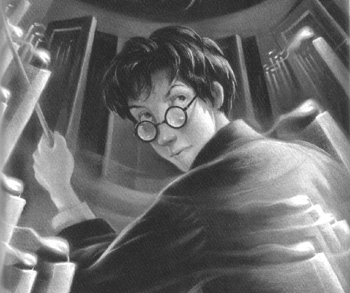![[Metroactive Books]](/books/gifs/books468.gif)
[ Books Index | Santa Cruz Week | SantaCruz Home | Archives ]
Teen angst comes to Hogwarts in 'Harry Potter and the Order of the Phoenix,' a slightly disappointing entry that will still give fans their fix
By Jessica Neuman Beck
By now, everyone's familiar with the story: single mother writes series of bestsellers, skyrockets into instant notoriety, becomes richer than the queen. Classic rags-to-rock-star tale, complete with the sold-out stadium appearance in lieu of traditional booksigning. And we all know the answers to the important questions: Was there crying involved in the killing of a major character? Were copies of the manuscript stolen and then sold on eBay? Did she suffer writer's block, or didn't she? And if not, why the hell did it take so long for us to get our grubby little hands on Book Five?
But in the end, we're left with a mammoth 870-page tome far too large to fit in most handbags, and we find ourselves asking the most important question of all: Is it any good?
The answer, happily, is yes.
Harry Potter and the Order of the Phoenix (Scholastic; 870 pages; $29.99 cloth) brings everyone's favorite wizard one step closer to taking over the world--and Harry does pretty well, too. The story opens, as usual, at the house on Privet Drive, only this year Harry's fed up. He's not just miserable, he's moody. He's becoming the kid who sits in his room listening to goth rock and feeling that no one understands him. One might even say he's grown somewhat whiny. J.K. Rowling says she listened to a lot of Morrissey while writing this book, and it shows.
Harry does have a good excuse: he's stuck in Muggle hell, his friends send only sporadic, falsely cheerful notes via owl and he's being mocked by the wizardly equivalent of The New York Times.
Back at Hogwarts, things aren't much better. No one aside from his core group of friends believes that Voldemort is back from the dead. In fact, his fellow students seem to think Harry's a bit of a nutcase, and a showoff to boot. For someone who regularly rescues his peers from ultimate evil, this might not seem like the end of the world--but to a 15-year-old boy, it's devastating. Rowling never loses sight of the fact that her protagonist is an adolescent, and she lets him feel isolated and angry where his younger self might have drummed up a plucky optimism. Only a smattering of pimples across his chin could make him more realistic. Even Harry's first kiss is fraught with uncertainty--he likes it, but he isn't sure that under the circumstances he should like it, and besides, he should be worrying about other things, right? (And it's about time there was kissing in the hallowed halls of Hogwarts, isn't it? These are teenagers we're talking about.)
That's not to say that The Order of the Phoenix is all it was cracked up to be. This book was so eagerly anticipated that it presold over a million copies worldwide, and that sort of anticipation naturally begets disappointment. The book offers precious little in the way of revelation--a notable exception being a flashback involving Harry's father--and a few of the plot points fall short of the mark (a groundbreaking explanation from Dumbledore that isn't; a disappointing lack of prescience surrounding a gift from Sirius Black).
But on the whole, these are forgivable. Let's face it, the only way the book could have lived up to the hype is if Harry were revealed to be Ron's little sister in drag. Look for this development in Book Six.
The Order of the Phoenix has everything we've grown to expect from Harry's world--broomsticks, Quiddich, strange beasties and disposable Defense Against the Dark Arts teachers--as well as an element of pathos that was absent from Harry's previous years at Hogwarts. He may not be the cute, cuddly wizard-in-training of yesteryear, but he's becoming something much more interesting. I for one can't wait to see what happens next.
2003 Summer Lit Issue:
Copyright © Metro Publishing Inc. Maintained by Boulevards New Media.
Buy 'Harry Potter and the Order of the Phoenix' by J.K. Rowling
![]()

Harry Potter's So-Called Life
![[line]](/gifs/line.gif)
Jessica Neuman Beck's top 10 personal favorite books
'Living History' by Hillary Rodham Clinton
'Get Your War On' by David Rees
'Oryx and Crake' by Margaret Atwood
Harry Potter slash fiction
'Beyond Belief' by Elaine Pagels![[line]](/gifs/line.gif)
From the July 16-23, 2003 issue of Metro Santa Cruz.